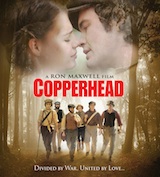 Copperhead. Director/Producer: Ron Maxwell; Screenwriter: Bill Kauffman; Based on the 1893 novel The Copperhead by Harold Frederic. Starring Billy Campbell, Angus Macfadyen, and Peter Fonda. Swordspoint Productions.
Copperhead. Director/Producer: Ron Maxwell; Screenwriter: Bill Kauffman; Based on the 1893 novel The Copperhead by Harold Frederic. Starring Billy Campbell, Angus Macfadyen, and Peter Fonda. Swordspoint Productions.
Available on DVD and Blu-ray April 15, 2014. Film had limited release on June 23, 2013
Director Ron Maxwell leaves the front lines of the Civil War for a film set on the Yankee home front in Copperhead, his third Civil War–era film based on a historical-fiction novel. Gettysburg and Gods and Generals were based on Michael and Jeff Sharra’s historical novels and dealt with the battlefields and the personalities fighting the war on the front lines. Copperhead, drawn from Harold Frederic’s 1893 novel, looks behind the lines at the political tensions underlying the war’s origins—tensions that are exacerbated as the casualty lists grow.
Abner Beech (Billy Campbell) lives with his family in rural upstate New York in the summer of 1862. The Beeches, along with a few other residents, are loyal “Peace Democrats” opposed to what they view as President Abraham Lincoln’s disregard of the Constitution and usurpation of liberty. Beech is not rabidly pro-slavery or Pro-South, per se, but more anti-Lincoln, disgusted with the Republican Party’s war aims and their actions in suppressing “treasonous” speech. Just like the country itself, the Democratic Party is split into factions. “Peace Democrats” like Beech are labeled, and libeled, as “Copperheads” after the venomous snake. But these Copperheads soon turn the label into a source of pride by cutting the heads of Liberty out of copper pennies and wearing them on their lapels.
Beech’s antagonist is Jee Hagadorn (Angus McFadyen), a fiery abolitionist fond of spouting verse and demonizing anyone who believes that destroying slavery isn’t worth destroying the Union and killing her sons. Hagadorn soon spreads rumors against Beech and attempts to turn the local populace against the town’s outnumbered Copperheads. However, Beech and Hagadorn’s private little war is complicated when Beech’s son Jeff and Hagadorn’s daughter Esther fall in love. Jeff, soon influenced by Hagadorn’s views, begins arguing with his father and starts using his middle name “Tom” instead of “Jeff,” rather than share the same name as Confederate president Jefferson Davis. Tom then joins the Union army and is disowned by his father.
The political tensions between the Copperheads and Republicans reach a new boiling point during the 1862 mid-term elections when the Democratic Party made serious inroads into Republican majorities at both the national and local level.
I won’t spoil the film with any further plot points. Instead, here are my impressions. Copperhead, while not as epic as Maxwell’s other Civil War films, will be familiar to fans of those movies. The establishing landscape shots and orchestral music are as epic as in his others, but the drama, sadly, is not. While I can understand the need to immerse the audience into the historical period in which the movie is set, too much of the film is given to lengthy exposition. Even Peter Fonda seems bored with asking the script’s obvious set-up question and having to listen to the monologue that follows.
The film’s setting should have provided a larger examination into the emotions that lay behind the war’s political origins, but the conclusion is weak. Hagadorn stirs the town’s populace into a frenzy of violence (behind the scenes, apparently, since he is portrayed as slightly unhinged), but when a gang marches to Beech’s farm to do mischief, they appear easily ashamed by their actions. This seems odd considering the North invaded the South to prevent disunion. You’d think those same citizens would react more strongly to a “Copperhead” living in their town. But this, I think, may have been Maxwell and writer Bill Kauffman’s point. Copperhead is a really a film directed at 21st-century audiences about tolerance, dissent, and the dangers of faction-ism, rather than a true historical drama of Civil War political dissent as it affected 19th-century Americans.
What the film also lacked is a connection with the characters. I felt like an outsider. I was not drawn into the story and didn’t have any strong feelings for one side or another—other than the rather obviously sympathetic treatment of Beech and his views on the origins and prosecution of the war, a common theme of Maxwell’s other films.
Still, Maxwell has to be commended for making films dealing with the most catastrophic period in American history without expectation of them being commercially successful. However, while Gettysburg was epic in scope and exciting to watch, and Gods and Generals was controversial, the History Channel has presented better films on the Civil War. Copperhead, by contrast, is tame and ultimately uninteresting.
Two stars out of five.
Neal West is a retired Air Force NCO with an MA in Civil War Military History. He lives in Southern Maryland and frequently volunteers at Manassas National Battlefield as a living historian.
[nggallery id=151]




